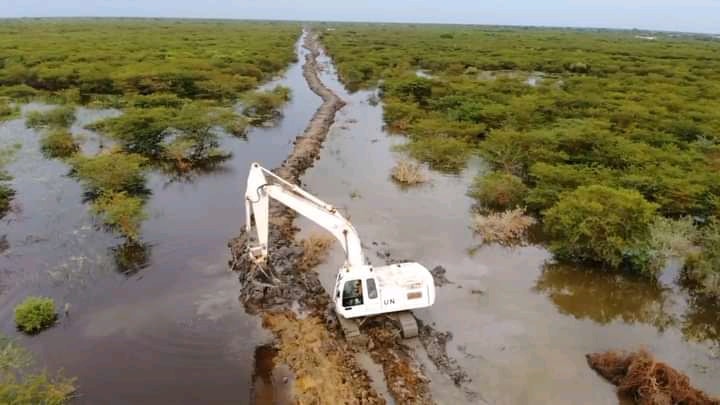You are here: Home | Humanitarian | News | Bentiu, Rubkona need 50 water pumps to remove flood water – official

UN peacekeepers building 4 kilometers of dyke to stop massive flooding caused by incessant rain. (UNMISS)
Authorities in Unity state have said it needs at least over 50 water pumping machines for removal of flood water from the Dyke in Bentiu and Rubkona before next rainy season.
This is according to the State Minister of Local Government, William Dak.
Dak, who is also the acting governor says the whole population in Bentiu will face extreme flooding if the area is not protected against flooding before the onset of the next rainy season.
The Unity state is racing against time to secure Bentiu and its surrounding areas from flooding as the next rainy season is a few months away.
The State Minister of Local Government needs 52 water pumping machines to help pump the current volume of water out of the Dyke.
“To get the water out of the Dyke, we need to have 52 water pumping machines with the capacity of 10,000 liters per minute for Rubkona and Bentiu town,” Dak said.
“For the rainy season to come, we need to prepare ourselves. If those machines were there, I think the next rainy season would have no problems. But if these plans remain on paper, I don’t think we will remain here.”
South Sudan is experiencing the worst flooding in 60 years. More than 850,000 people have been affected and need urgent life-saving support, according to the International Organization for Migration.
The worst-hit is Unity State where 220,000 people have been affected, including 110,000 IDPs who were already displaced due to conflict.
The flooding is a big blow to the youngest nation in the world, which is already facing one of the world’s worst humanitarian crises with about 8.3 million people in need of humanitarian assistance due to conflict and climate change.
Here in Bentiu, 5 displacement sites have come up in the last few months, hosting 19,000 people.
When floodwaters engulfed Angela Chagor’s village in Nyeromni of Nhialdiu last July, the 28-year-old woman thought it was going to subside. But water level continued to increase, forcing Angela to flee her home, saving only her four children.
“All my property remained behind, the sleeping mat and everything, because I was saving my children from the floods,” Chagor said.
“The floods make me worry about my children. what will I do with the children without their father?” she added.
The whole of Bentiu town and the largest IDP camp in Rubkona County is surrounded by water. Inside the IDP camp, there are more than 110,000 people who have been affected by conflict. And another 20,000 were affected by flooding.
Families are struggling to cope with the devastating impact of the floods. They have lost their livestock and crops, their entire livelihoods, leaving them not only homeless but experiencing food insecurity and increased threat of diseases such as malaria as well as inter-communal conflict.
Amy Pope, the Deputy Director General for Management and Reforms at the International organization for Migration described the situation as unimaginable.
Speaking during IOM visit to Bentiu on Thursday, Pope says many people have been forced to leave their communities by flooding.
“It is almost unimaginable. People have been forced to leave their communities, livestock has died, there is tremendous food insecurity,” Pope said.
“People are more threatened by things like malaria and other diseases. It is having a tremendous impact on the people of this community in very devastating ways.”
IOM is a key partner in the flood response efforts in Bentiu, and wider South Sudan.
Ongoing efforts have included construction and reinforcement of berms and dykes, and deployment of trash pumps to ensure continued humanitarian access at the airport and along core supply roads.
Ugochi Daniels, IOM’s Deputy Director General for Operations says they are not only committed to providing life-saving responses but also designing medium and long-term flood mitigation programmes.
This, she says, is aimed at strengthening resilience to climate-related shocks in South Sudan.
“We are especially grateful to the Government of the Netherlands and to the World Bank for the funding and support on water management here in Bentiu,” Daniels said.
“With that support, we were able to address the immediate need and secure Bentiu during the flooding.
“We are also preparing for the rainy season which is coming and building up the dikes to ensure that Bentiu stays secure.”
However, she stresses that resources are not enough to undertake the huge flood response and mitigation programmes.
Support Eye Radio, the first independent radio broadcaster of news, information & entertainment in South Sudan.
Make a monthly or a one off contribution.
Copyright 2024. All rights reserved. Eye Radio is a product of Eye Media Limited.